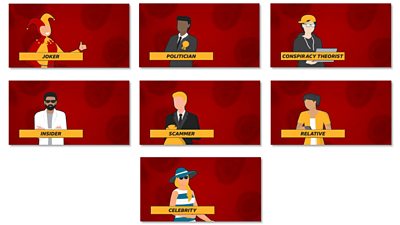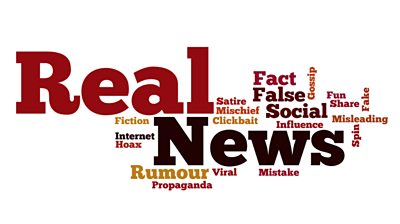Words matter. Misinformation, fake news, disinformation, conspiracy theoriesβ¦so many different ways of describing how we can be deceived, either deliberately or inadvertently with misleading information. The ΒιΆΉΤΌΕΔ encourages people to think critically about what they read, see and view so that they can spot misleading or bad information, and resist sharing content that might be false or out of context.
ΒιΆΉΤΌΕΔ Young Reporter is a ΒιΆΉΤΌΕΔ project that delivers "Real News" workshops to young people across the UK and around the world, helping them identify trustworthy sources of information.
Here are some key explanations of how the ΒιΆΉΤΌΕΔ uses some frequently used words.
|
Misinformation |
An umbrella term to describe false, misleading or out of context material regardless of the motivation behind it. It can also be described as bad information. |
|
Disinformation |
A deliberate attempt to mislead using material that the deceiver knows is untrue, designed to be widely shared. The purpose is often to persuade people to think a certain way, vote a certain way or to make money from advertising each time someone clicks on a story. |
|
"Fake news" |
A vague, but popular colloquial term widely used across many languages. Politicians and activists have used the term as an insult against their opponents or a way to dismiss stories they simply don't like, no matter whether they are factual or not. |
Other common terms you might encounter:
|
Ban |
Closing an account permanently. |
|
Chans |
One of a number of internet message boards devoted to a whole host of subjects β from cartoons to pop culture to pornography to neo-Nazi politics. The most infamous is 4chan. |
|
Copypasta |
a piece of text that is copied and pasted across the internet. Different from something that is shared, βcopypastaβ messages can seem original to those who donβt examine them very closely. |
|
Dark web |
A collection of sites that can only be visited using a special, almost totally anonymous browser called Tor. The dark web is home to illegal activity, scams, but also dissident and underground activity in places where freedom of speech is lacking. Often confused with the βdeep webβ. |
|
Deep web |
Online information that is not indexed by the main search engines, and thus more difficult to find than information on the βsurface webβ. Often confused with the βdark webβ. |
|
Demonetization |
A process whereby content that violates certain network rules is not removed, but its creators are stopped from collecting any advertising revenue. Most often used in reference to YouTube. |
|
Foreign interference |
Inauthentic behaviour sponsored by or promoted by a government or government-related entity, with the express purpose of influencing the political system of another country. |
|
Inauthentic behaviour |
A term used by social networks to describe co-ordinated activity by fake or misleading accounts for a specific purpose β usually financial or political gain. It is against the rules of most major social media companies. |
|
Moderator |
Someone who works for a social media company examining content and, as necessary, labelling it or removing it if it violates network rules. |
|
Network |
A social media outlet, which can take the form of a website or app. Also called a βplatformβ; collectively a shorthand for all the biggest networks is βsocial mediaβ |
|
Platform |
See above. |
|
Restrictions |
Social media companies can take various measures to stop posts going viral or punish accounts that violate rules. For instance: preventing posts from being shared or commented upon; preventing a particular user for posting for a certain amount of time; requiring a them to remove content that violates rules before being allowed to post again. |
|
Share |
A way to repost someoneβs piece of content onto a different account. Accumulating shares makes a post go viral. |
|
Viral |
Very popular on a social network. |
Seven types of misinformation spreaders
The ΒιΆΉΤΌΕΔβs disinformation team β who help to spot and debunk misinformation and disinformation - have identified seven types of people who start and spread viral misinformation: the joker, the politician, the conspiracy theorist, the insider, the scammer, a relative (including friends and family) and celebrities.

